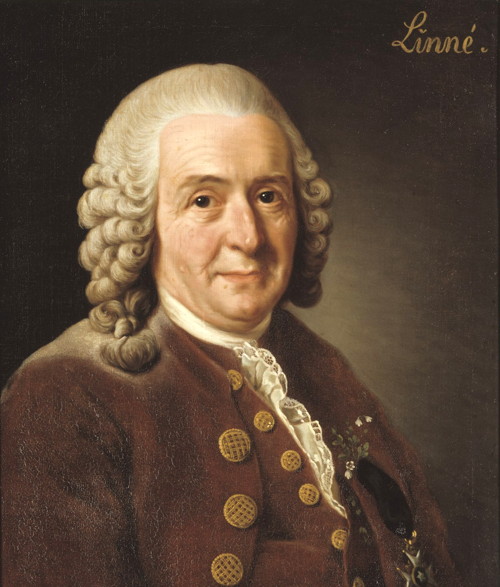Carl Linnaeus (1707–1778)
Carl Linnaeus (Swedish name Carl Nilsson Linnaeus) was a Swedish botanist, physician, and zoologist, who laid the foundations for the modern scheme of binomial nomenclature. He is known as the father of modern taxonomy, and is also considered one of the fathers of modern ecology. Many of his writings were in Latin, and his name is referred to in Latin as Carolus Linnaeus and, after 1761, Carolus von Linné.
Linnaeus was born in Småland, southern Sweden. He received most of his higher education at Uppsala University, Sweden, which is the oldest university in Sweden, founded in 1477. Linnaeus gave lectures at Uppsala University in botany in 1730. Linnaeus went to the Netherlands in 1735, promptly finished his medical degree at the University of Harderwijk, and then enrolled in the University of Leiden for further studies. That same year, he published the first edition of his classification of living things, the Systema Naturae. During these years, he met or corresponded with Europe’s great botanists, and continued to develop his classification scheme.
In 1738, he returned to Sweden, where he practiced medicine (specialising in the treatment of syphilis) and lectured in Stockholm before being awarded a professorship at Uppsala in 1741. At Uppsala, he restored the University’s botanical garden (arranging the plants according to his system of classification), made three more expeditions to various parts of Sweden, and inspired a generation of students. In the 1750s and 60s, Linnaeus continued to collect and classify animals, plants and minerals, and published several volumes. At the time of his death, he was one of the most acclaimed scientists in Europe.
Those aware of Linnaeus’ attitude to the prospect of plants being carnivorous may wonder why his contribution is recognised here. Linnaeus subscribed to the traditional view and religious understanding of the order of the natural world – the doctrine of a rigid natural world, created by God, in which species are divine and stable. He held that God had designed plants only for the sustenance of animals and men, and that the idea of plants that could wield power over animal life was blasphemous. Despite these beliefs his contribution was indeed significant and in seminal work Species Plantarum (1753) he described the genera Aldrovanda, Drosera, Nepenthes, Pinguicula, Sarracenia and Utricularia and many individual species of carnivorous plants.
For more information on the life of Carl Linnaeus please see Wikipedia.
The ICPS claims no copyright on the content of this page. Please see the list of sources used for the pages on key historical figures in the study of carnivorous plants.

Carl Nilsson Linnaeus. Painting by Alexander Roslin.
